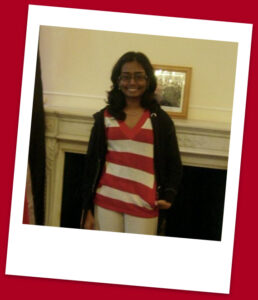"We should be mindful of television's subliminal messages"
May 14 TV programming can colour our impressions of countries, cities or events through presenting a warped vision of reality, writes Samantha Khan, 19, a Commonwealth Correspondent from Trinidad & Tobago.
TV programming can colour our impressions of countries, cities or events through presenting a warped vision of reality, writes Samantha Khan, 19, a Commonwealth Correspondent from Trinidad & Tobago.
During a recent wave of boredom I found myself channel surfing. The flood of poisonous programming was striking:
Reality shows misrepresenting reality. Cartoons blurring the line between fun and danger. News broadcasts spouting biased information like polluted geysers.
It would make previous generations cringe. But really, how dangerous are a few less-than-wholesome programs?
The answer lies in the term itself. Programs. Programming.
Though not named for this particular quality, television programs have a way of sneaking in to our brains and programming us. Like little pixies, the messages sent by these broadcasts enter our minds and begin tinkering with our thinking.
It may be obvious, like young children knocking on trashcans in an effort to find Oscar the Grouch, or be subtle, like the urge to consistently check the weather reports after seeing one too many disaster movies.
And this is not inherently dangerous. After all, where is the harm in believing that green monsters live in garbage cans or being extra cautious when the weather turns gloomy? The danger comes when a warped version of reality is sold as the genuine thing.
The picture that comes to mind is that of a dapper individual, selling gold jewellery in a well-reputed establishment. We purchase a glittering necklace, paying little mind to the salesperson. We wear the piece proudly, and soon it becomes exposed to the reality of life.
And much to our surprise, our lovely specimen of genuine gold becomes tarnished. We seek retribution but our claims are worthless because there is no one to be held responsible. The trusted establishment has asked for proof of purchase, but the bill has been long lost and we have no hope of identifying this faceless salesperson.
In much the same way, television peddles information that will not stand the test of reality. For example, when the armed hero of an action movie encounters a locked door, what does he do? He shoots the lock. Thus, if ever in a similar situation we would most likely shoot the lock as well.
What few of us know, however, is that in reality the bullet will ricochet off the lock without breaking it- a fact proven by the Discovery Channel’s Mythbusters. We end up caught by our pursuer or shot in the nose. And where is the faceless media mogul? Where is the trusted television network? (Please forgive the glaring irony in the fact that I’ve cited a television program to support this point!)
Admittedly, the above scenario is far fetched. However, the misrepresentation of reality affects our daily lives. News broadcasts colour our impressions of various countries, cities or events by presenting us with only one aspect of the subject matter. This deceptive treatment creates a solely bleak or solely positive picture of a multifaceted entity.
Another example lies in reality television. The “reality” of the wealthy, badly behaved or melodramatic stars is not the reality of the everyday person. While this is a large part of the appeal, after absorbing these programs we may subconsciously adopt the behaviour portrayed.
This would not be harmful if the stars acted in a realistic, rational manner. But reality TV seeks to be “entertaining” and so it often highlights and exaggerates poor morals, fights, toxic relationships and general trouble-making in an attempt to grasp our attention.
All in all, this is not to say that we should boycott television. Instead, we should be mindful of the subliminal messages that threaten to submerge us. We should guard against the mischievous pixie programmers by critically analysing what we watch.
Through this analysis we can separate our own perceptions and values from those that we are fed, thereby retaining more control over what we apply to our lives.
…………………………………………………………………………………………………………………
About me:
“Hello! I’m a student from Trincity, Trinidad, and I love to write, read and sometimes draw. I would live in the cinema if I had the choice. I enjoy learning about as many different cultures as I possibly can.
“My dream is to become a novelist and through that, to challenge the stereotypes and constraints of society, as well as to provide thought-provoking material to shed new light on life itself. I believe that if we all shine a little light into the world, it will inevitably become a brighter place.”
…………………………………………………………………………………………………………………
Opinions expressed in this article are those of the author and do not necessarily represent the views of the Commonwealth Youth Programme. Articles are published in a spirit of dialogue, respect and understanding. If you disagree, why not submit a response?
To learn more about becoming a Commonwealth Correspondent please visit: http://www.yourcommonwealth.org/submit-articles/commonwealthcorrespondents/
…………………………………………………………………………………………………………………




